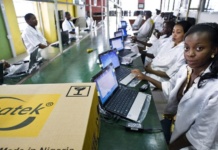
By Prof Ojo Emmanuel Ademola – AI’s impact in Africa spans far beyond healthcare, reaching into agriculture, education, finance, and transportation. AI technology is transforming farming practices with precision agriculture, crop monitoring, and predictive analytics in agriculture. By utilising drones, sensors, and data analysis, farmers can optimise resource use, increase productivity, and reduce risks, leading to improved food security and livelihoods in rural areas.
Across education, AI innovations are enhancing personalised learning experiences, adaptive e-learning platforms, and virtual tutoring services. Through analysing student data and preferences, AI assists educators in tailoring learning paths, identifying areas for development, and enabling interactive teaching methods, thereby enhancing education access and outcomes throughout Africa.
AI is revolutionising customer service, fraud detection, credit scoring, and risk management in the financial sector. By utilising AI algorithms for data analysis and predictive modelling, financial institutions are able to streamline processes, enrich customer experiences, and minimise financial risks. For instance, AI-powered chatbots provide immediate customer support, while machine learning algorithms detect suspicious activities, preventing fraudulent transactions and upholding the integrity of financial systems.
Additionally, AI is transforming logistics, traffic management, and driver safety in the transportation sector. Utilising AI for route optimisation, predictive maintenance, and autonomous vehicles allows transportation companies to enhance operational efficiency, reduce fuel consumption, and improve road safety. AI-driven traffic management systems analyse real-time traffic data, predict congestion areas, and optimise traffic flow, resulting in smoother transportation networks and better commuting experiences for individuals.
The extensive impact of AI in Africa extends across multiple sectors, presenting significant opportunities for innovation, growth, and development. By embracing AI technologies and maximising their potential, African nations can accelerate progress, stimulate economic prosperity, and enhance the quality of life for all citizens. As Africa embraces the digital era and leverages AI advancements, the continent is positioned to unlock new possibilities, overcome challenges, and create a more inclusive and sustainable future for generations to come.
In healthcare, the integration of AI is revolutionising how medical professionals diagnose, treat, and manage diseases, transforming patient care throughout Africa. AI systems can improve healthcare delivery by boosting diagnostic accuracy, enhancing treatment outcomes, and streamlining operational processes within healthcare facilities.
A key advantage of using AI in healthcare is its ability to swiftly and effectively analyse large volumes of medical data. By processing electronic health records, medical images, genomic data, and other healthcare information, AI algorithms can extract valuable insights and patterns that may be overlooked by human clinicians. This data-driven approach empowers healthcare providers to make informed decisions based on evidence, leading to more precise diagnoses and personalised treatment plans for patients.
AI applications like predictive analytics are pivotal in proactive healthcare management. By analysing patient data over time, AI algorithms can forecast health risks, detect disease progression patterns, and predict outcomes. This predictive ability enables early intervention, tailored preventive measures, and individualised interventions, improving health outcomes and reducing healthcare costs.
Moreover, AI technologies are transforming patient engagement and care coordination. AI-powered virtual health assistants provide personalised health information, remotely monitor symptoms, and offer real-time support. This virtual care model not only enhances patient experience and convenience but also boosts treatment plan adherence and chronic condition management.
In healthcare, the transformative impact of AI is creating opportunities to enhance patient outcomes, improve healthcare delivery, and address challenges in Africa. By utilising AI technologies, healthcare systems can drive innovation, boost efficiency, and deliver high-quality, accessible healthcare. Embracing AI advancements in healthcare positions Africa as a leader in leveraging technology for better health outcomes, paving the way towards a healthier and more prosperous future.
The integration of AI in telemedicine is revolutionising healthcare delivery, particularly in underserved areas across Africa. AI-powered telemedicine improves access to quality healthcare, enhances patient outcomes, and bridges gaps in healthcare delivery in regions with limited resources.
A key advantage of AI-driven telemedicine is enabling remote consultations between patients and healthcare providers. Individuals can seek medical advice, receive diagnoses, and discuss treatment options without physical visits to healthcare facilities through video calls, text messaging, or chatbots. This real-time interaction allows patients to access timely care, consult specialists, and receive medical guidance regardless of their location or proximity to healthcare centres.
AI technologies significantly enhance the monitoring and management of chronic conditions through telemedicine platforms. Remote patient monitoring devices equipped with AI algorithms track vital signs, collect health data, and provide continuous feedback to healthcare providers. This proactive approach effectively manages chronic diseases like diabetes, hypertension, and heart conditions. AI-powered tools offer personalized care plans, medication reminders, and lifestyle recommendations, improving health outcomes and enhancing disease management.
AI-driven telemedicine expands access to healthcare services in underserved areas with limited traditional healthcare infrastructure. Integrated with AI capabilities, mobile health applications allow remote and rural communities to connect with healthcare professionals, access medical information, and receive virtual consultations. This overcomes geographical barriers and improves healthcare access for marginalized populations. This innovative approach extends the reach of healthcare services and empowers individuals to take charge of their health, seek timely interventions, and actively engage in their care management.
The integration of AI technologies and telemedicine is revolutionizing healthcare delivery in Africa, providing transformative solutions to tackle healthcare disparities and elevate health outcomes for all. By embracing AI-powered telemedicine, healthcare systems in Africa can leverage technology to enhance access to quality care, optimize disease management, and promote better health outcomes. This advances the goal of universal healthcare coverage and enhances the well-being of communities throughout the continent.
In the realm of medical imaging analysis, AI-powered algorithms are reshaping disease diagnosis and treatment. Traditional methods of interpreting X-rays, CT scans, MRIs, and ultrasounds require time and expertise, leading to delays in diagnosis and treatment. AI technologies automate image interpretation with speed and precision by accurately detecting abnormalities, identifying patterns, and aiding healthcare providers in early disease diagnosis. For instance, AI applications in radiology can pinpoint suspicious areas in mammograms, detect lung nodules in chest X-rays, and identify signs of diabetic retinopathy in eye scans, enabling timely and accurate diagnoses.
The integration of AI in medical imaging enhances healthcare efficiency and improves patient outcomes by enabling early disease detection and treatment. AI algorithms expedite the diagnostic process, reduce the risk of misdiagnosis and prompt appropriate treatment plans. Early detection of diseases like cancer, tuberculosis and diabetic retinopathy can significantly impact patient prognosis, improve treatment success rates and ultimately save lives.
Moreover, AI-powered medical imaging analysis has the potential to lower healthcare costs by streamlining diagnostics, reducing unnecessary tests and procedures and optimizing resource allocation. AI algorithms can triage cases based on severity, enhancing workflow efficiency and resource allocation and ensuring timely and appropriate care for patients. This enhances healthcare quality, cost-effectiveness and resource efficiency within healthcare systems.
AI’s transformative role in medical imaging analysis is revolutionising diagnostic medicine, providing advanced tools and technologies to aid healthcare providers in early disease detection, accurate diagnosis and timely treatment. By utilising AI algorithms to analyse medical images, healthcare systems in Africa can enhance patient care, improve clinical outcomes and enhance healthcare delivery efficiency, ultimately changing the landscape of disease diagnosis and management throughout the continent.
Conclusively, the potential of AI in revolutionising healthcare delivery and enhancing the quality of life for African communities is significant. By harnessing AI technologies, Africa can improve healthcare access, quality and effectiveness, transforming healthcare delivery across the continent. Collaboration between policymakers, healthcare providers and technology innovators is crucial to leverage AI advancements for positive healthcare outcomes and uplift the well-being of African populations.










